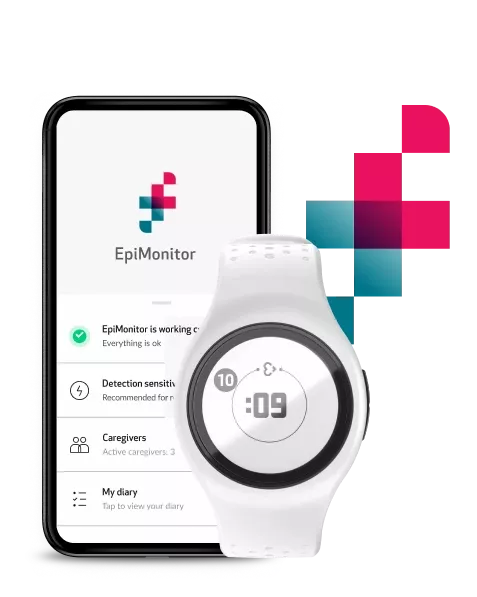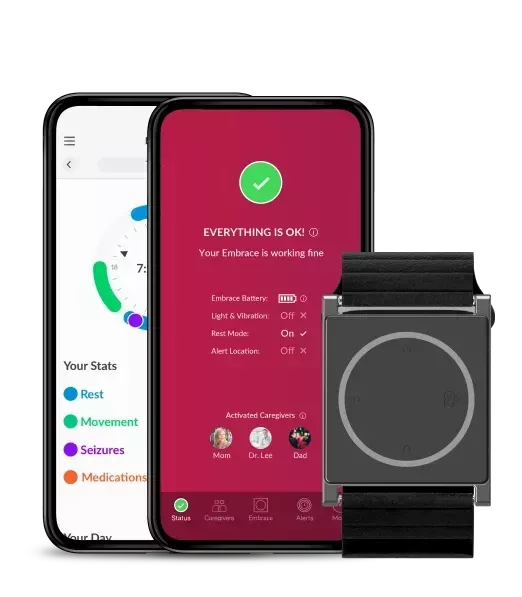4YouandMe uses Empatica's tech to quantify levels of stress in chronic diseases

This post was co-written with Dr. Stephen Friend, a Professor of connected medicine at the University of Oxford, Chairman and co-founder of Sage Bionetworks, and co-founder and President of 4YouandMe and Dr. Sarah Goodday, a Senior Research Fellow in the Department of Psychiatry at the University of Oxford and Lead Research Scientist at 4YouandMe.
Dr. Friend is an authority in the fields of genetic resilience, cancer biology, and wearable digital health technology focused on empowering individuals to regain agency and co-navigate their own health paths. He has been exploring wearables for a decade and after working with the COO at Apple on Health Strategy, he now leads 4YouandMe where they work to evolve ways for wearable DHTs to empower individuals so one day we can forecast who will experience which symptoms and who will benefit from which intervention.
Dr. Goodday is a Senior Research Fellow in the Department of Psychiatry at the University of Oxford and Lead Research Scientist at 4YouandMe. Her scope of work centers on stress and other bio-psychosocial risk factors as prevention and early intervention targets of mental and physical health outcomes during life transitional periods
4YouandMe is a non-profit company composed of researchers, engineers, mathematicians, and clinical partners. Formed in 2017, 4YouandMe aims to help lower the burden of chronic diseases, through the active development of research cohorts.
4YouandMe’s co-founder and President, Professor Stephen Friend, said, “Our mission is to provide control to individuals in managing their daily health, with the goal to build innovative, affordable healthcare strategies that can help prevent and better manage chronic conditions”.
4YouandMe has conducted several feasibility digital health studies to understand how smartphone apps and wearable devices can be used to detect and track stress and individual symptom trajectories of disease across a number of different populations.
These include the Better Understanding the Metamorphosis of Pregnancy (BUMP) study, the Stress in Crohn’s study, the Help Enable Real Time Observations in CNS and Pancreatic Cancer studies, the Stress and Li-Fraumeni Syndrome (LFS) study, the Stress in Cardiovascular Disease (Fabric of Life) Study, the My Experiences study (mental health) and others.
Using wearable tech to quantify levels of stress in those with chronic medical conditions
Stress is known to negatively impact both the day-to-day effects and long-term progression of Crohn’s disease, but there is a lack of research examining this relationship.
Stress can be very hard to quantify. Relying on the subject’s experiences and perceptions of their own stress is subjective. Two people experiencing similar levels of stress may express this very differently, and even in a single individual, their recollection of stress may vary based on the response window they are asked to assess their stress within.
Measuring EDA with validated wearable technology ensures a continuous collection of physiological data, as well as an objective and accurate way to measure stress.
Using Empatica’s wearable tech, 4YouandMe’s Stress in Crohn’s study aimed “to explore how wearable devices and smartphone app data could quantify individual level stress responses and whether these digital stress responses could be used to help predict changes in Crohn’s disease clinical symptoms”.
Another of 4YouandMe’s studies used Empatica’s EmbracePlus wearable to explore stress in Li-Fraumeni Syndrome (LFS). LFS is associated with considerable mortality and morbidity and a high probability of developing cancer at an early age. Patients and their families have to attend many appointments and frequently wait for the outcomes. As a result, families or caregivers of someone living with LFS are highly likely to experience a great deal of stress and anxiety surrounding the anticipation of cancer onset or recurrence for themselves and also their family members.
Goodday said, “The objective of the Stress and LFS study was to determine the feasibility of using wearable devices and smartphone app data to track stress in families with Li-Fraumeni Syndrome. More specifically, this study aimed to: determine engagement and burden in the use of these personal digital health tools (DHTs) for stress monitoring in families; determine how personal DHTs function in children; determine whether data from personal DHTs can be used to follow individual level stress signals; and determine whether the timing of cancer surveillance is associated with changes in personal DHT stress related signals”.
The value of using Empatica’s technology
4YouandMe wanted to use wearable devices that showed promise in following individual level stress, including several physiologic measures, but Electrodermal Activity (EDA) was of particular interest. Friend stated, “We chose Empatica’s technology as EDA was the most important measure for us, however it is also a feature that a lot of other wearables we considered lacked.”
EDA, also known as skin conductance or galvanic skin response, is the property of the human body that causes continuous variation in the electrical characteristics of the skin and can tell us a lot about the state of our body and mind. It’s commonly used to detect stress levels and tends to increase with emotional or physical arousal.
Stress detection through wearable signals has proven challenging given the high heterogeneity within and between individuals. Some recent studies suggest that EDA in comparison to other potential wearable signals may be more reliable and accurate at detecting acute stress states within individuals.
Empatica’s tech continuously collected data for 6+ months
Goodday said of Empatica’s wearable tech: “[EmbracePlus] devices were worn by research participants continuously for 6-9 months in the Stress in Crohn’s study and 6 months in the Stress in LFS study. The devices were used alongside a smartphone app that collected daily and intermittent surveys and active tasks of stress and symptoms, as well as additional wearable devices in the Stress in Crohn’s study”.
4YouandMe used the Empatica wearables to measure and examine EDA, HR, HRV, Respiratory rate, and temperature.
4YouandMe paired EmbracePlus data with machine learning to assess the relation between the EmbracePlus features and a range of stress states. Friend stated, “In collaboration with our partners at the Vector Institute for AI, the Alan Turing Institute, and the Department of Mathematics at Oxford we used a variety of machine learning and biostastistical methods to understand how different features from the Empatica devices are associated with different stress states. For example, we used a Generalized Additive Model (GAM) to analyze the association between time varying Empatica features and the proximity to clinical surveillance visits to understand whether the phenomena of ‘scan-xiety’ could be picked up - heightened stress and anxiety experienced by patients before a highly anticipated clinical visit”.
Discovering the diversity of stress levels with patients
So far, 4YouandMe has conducted preliminary analyses for both the Crohn’s and LFS studies and found that people are highly heterogeneous and unique.
Even within the context of a population with a disease such as Crohn’s, people experience stress in a unique way.
Friend stated that, “Empatica’s technology contributed to our awareness of how heterogeneous stress is within and between individuals.” He went on to say that, “Many individuals do not follow wearable aggregated trends, which highlights the danger of the reliance on population level analytic approaches, which many groups use when analyzing wearable data”.
Friend further stated “that this high heterogeneity seen in other 4YouandMe wearable studies appears evident in the Stress and LFS study from preliminary findings. Preliminary results surrounding the scan-xiety effect show how diverse the expression of stress-related signals from wearables are across individuals”.
4YouandMe plans to examine this data further, and when Friend was asked about where he thinks this approach could bring the most value, he said, “Broadly to many chronic conditions outside Crohn’s. The most value is likely in enabling patients to self-monitor, reflect, and potentially intervene in their own condition”.
Thank you to Stephen Friend and Sarah Goodday for your contribution to this blog. We look forward to seeing the full results and your research empowering patients to manage and intervene in their own chronic conditions in the near future.
EmbracePlus and the FDA-cleared Empatica Health Monitoring Platform have been used in thousands of research studies and clinical trials, to support a wide range of use cases, including sleep, epilepsy, migraine, depression, addiction, and more.
Talk to our team to discover how this FDA-cleared technology could help you achieve your next research breakthrough.
If you’d like to find out more about Stephen Friend’s, Sarah Gooday’s, and 4YouAndMe’s work, visit the website.





